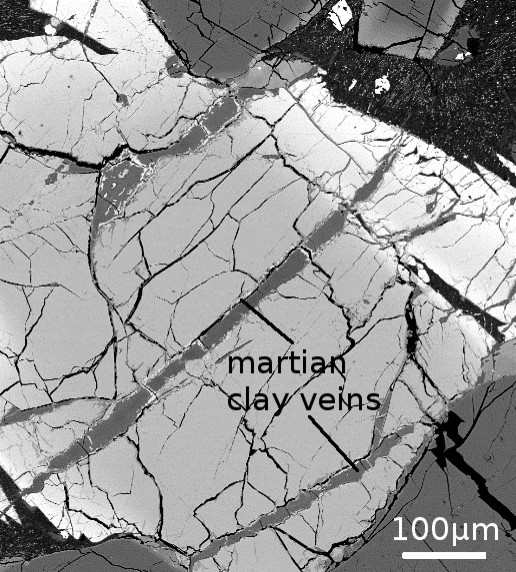Martian Clay Contained Chemical Needed To Create Life On Mars: Study

Researchers have discovered that clay from a Martian meteorite found in Antarctica contained boron, a chemical necessary to create life. This discovery indicates that the chemical conditions on Mars to create life could have existed at one point of the planet’s history.
The study, led by a team of researchers from the University of Hawaii at Manoa NASA Astrobiology Institute, was published in the journal PLOS One. The researchers believe the high concentration of boron is proof that Mars may have once had the chemistry to support the creation of life.
As the researchers point out, when boron is oxidized it becomes borate, which is essential to the creation of ribose. The compound is an essential part of RNA, which regulates genes and is a “building block of life.” Later in the evolutionary cycle of life, RNA can be easily synthesized but at the very beginning, borate is necessary to spur the formation and stabilization of the first strands of RNA.
According to the study’s abstract, “We have detected a concentration of boron in Martian clay far in excess of that in any previously reported extraterrestrial object. This enrichment indicates that the chemistry necessary for the formation of ribose, a key component of RNA, could have existed on Mars since the formation of early clay deposits, contemporary to the emergence of life on Earth.”
Mars and Earth were quite similar in their early history of development, note the researchers. The Martian meteorite was discovered by the Antarctic Search for Meteorites team during the 2009-2010 season and is clearly from Mars based on its chemical composition, notes the press release.
The discovery of large concentrations of boron in the Martian meteorite can lead to further understanding of the development of Mars as well as Earth, according to the news release. Borate-enriched clay is commonly found on Earth but never before in Martian rocks or other extraterrestrial objects. At the same time, the clay is more than 700 million years old, older than any clay found on Earth due to shifting plate tectonics.
Co-lead author Lydia Hallis, from UHNAI, says, “Over time, Mars has lost a lot of its atmosphere and surface water, but ancient meteorites preserve delicate clays from wetter periods in Mars’ history. The Martian clay we studied is thought to be up to 700 million years old. The recycling of the Earth’s crust via plate tectonics has left no evidence of clays this old on our planet.” Hallis believes studying ancient Martian clay could also lead new to new discoveries of the early history of Earth.
© Copyright IBTimes 2024. All rights reserved.






















